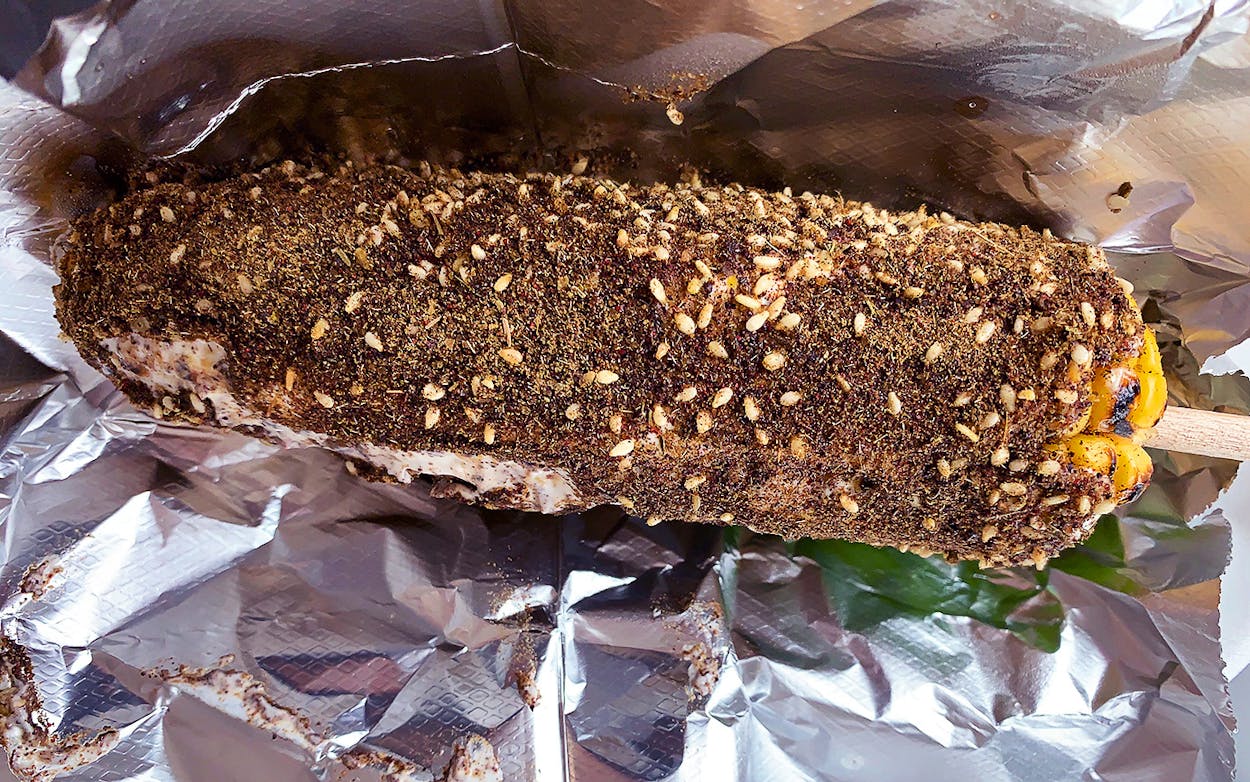Locura’s blink-and-you’ll-miss-it reddish-orange stucco exterior, pepped up with small banners advertising the shop’s name (Spanish for “madness”), barely hints at the colorful displays inside. Pass through the front door of the four-month-old store to see strings of dried corn husks dyed pink, blue, green, purple, yellow, and red hanging above the entryway. More husks adorn a framed sign above the ordering counter; they’re the first hints of what’s prepared in Locura’s kitchen. The eastern interior wall is painted dark turquoise, with a geometric gold stencil that evokes the sun. Once the brick-and-mortar home of Trompo–a specialist in Monterrey-style tacos de trompo, the northern cousin to Mexico City’s al pastor—the space is now what chef Laura Carrizales and her partner Mel Arizpe call a takeaway “small bites” shop. The word TACO in white letters on a black field on the building’s façade remains. Inside are the same stand-up counters where Trompo’s dedicated customers munched on tacos. But tacos aren’t the star on Locura’s menu.
Instead, it’s all about elotes—what Americans commonly call Mexican-style street corn. Classically served on a skewered cob with mayo or cream, grated cotija cheese, chile powder, maybe Tajín, and lime, elotes are a popular sidewalk snack. But Carrizales isn’t restricted by tradition. She sees elotes as a base for experimenting with new flavors, much as other chefs have done with tacos. “With all the other food places that were opening that had Belgian waffles with a thousand flavors, tacos with everything imaginable—you can put anything into a taco these days,” she says. “And I thought this was going to be like the new frontier.”
A graduate of El Centro College’s culinary program in Dallas, Carrizales previously worked at several fast-casual eateries, fine-dining restaurants, and Central Market. It’s at the latter, she said, where she learned to embrace creativity using elements on hand. “Central Market allowed me to make what I wanted to make every single day. All they would say is ‘salmon’ or ‘beef’ or ‘pork.’ I could make whatever I wanted to make,” she says.
During a recent visit to the fully reopened Locura, I sampled four of the eight elotes: the comforting traditional elote; a punchy truffle- and parmesan-dusted variation; the unfortunately bland dulce de leche elote; and the Middle Eastern–inspired za’atar. That last one was my favorite.
A spice blend of Middle Eastern origin built around an herb called Lebanese oregano, wild thyme, or bible hyssop, the za’atar covering Locura’s elote is a thick coat of herbs and spices. It’s caked on with a smear of lemony mayo and speckled with sesame seeds. The result is by turns earthy and nutty, with toasty and bright touches. “I’m not afraid to push the boundaries or make somebody uncomfortable,” Carrizales says. “At the same time, I like homey, familiar flavors.”
Those flavors also reminded me of the Middle Eastern connection to Mexico. Lebanese immigrants brought spit roasting to southern Mexico in the early twentieth century. That style of cooking was adapted into what is now Puebla’s taco arabe (Arab taco), meat cooked on a trompo and served on a pitalike flour tortilla since the thirties. In the mid-twentieth century, it would transform again into Mexico City’s iconic taco al pastor and later the northern-style taco de trompo.
Other menu items include an array of pork plates, including a dry pozole of which Carrizales is particularly proud. Another dish is a cinnamon-spiced pork taco, topped with slivers of pineapple and with a coconut milk, that is nothing like what the previous occupant served. Carrizales also expects to offer more vegetarian tacos and occasionally a beef taco. One example is a sweet and milky tomato-and-asadero cheese taco special. It might seem like madness for an elotes and treats shop to offer tortilla-wrapped options, but this is Texas, after all, where even a Mexican ice cream shop is compelled to serve tacos.
Locura Small Bites
839 Singleton Boulevard, Suite 150, Dallas
Phone: 214-238-0551
Hours: Tuesday to Saturday, 11 a.m.–8 p.m.; Sunday, 11 a.m.–6 p.m.








